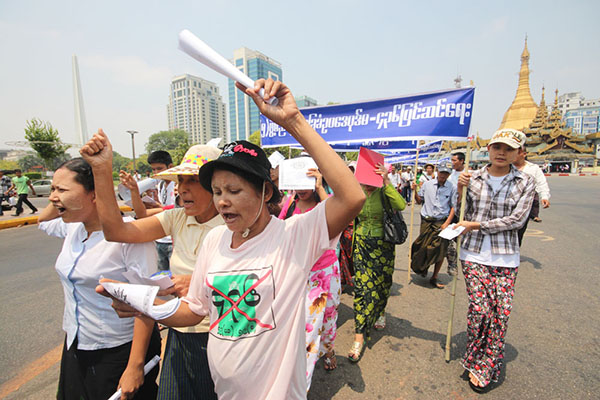Around 200 workers amassed in front of Rangoon’s City Hall on Thursday to mark International Workers’ Day, also known as May Day. Demonstrators demanded greater rights and protection for Burma’s labourers.
The crowd also took the opportunity to rally for several constitutional amendments. Contentious articles included 59(f), which bars opposition leader Aung San Suu Kyi from the presidency, and 436, which establishes highly restrictive criteria for amending the charter.
The protest was organised by an umbrella group comprising more than 1,000 trade unions in Burma. A similar demonstration was also held in central Burma’s Mandalay on Thursday.
In a separate May Day event in Rangoon, the Myanmar [Burma] Trade Unions Federation (MTUF) honoured surviving members of nationwide workers’ strikes of June 1974, during the time of Newin’s authoritarian rule. At that time, security forces opened fire on workers and students, leaving about 100 dead at the Thamaing Textile Factory and the Sinmalaik Dock Yard in Rangoon.
While workers’ rights and conditions have changed considerably from the bloody bygone days of Newin, labour unions in Burma are still struggling to find their footing as new jobs, new freedoms and new forms of exploitation emerge in equal step.
“Labour conditions in Burma are still inadequate and there is a lot of room for improvement regarding basic rights like fair wages,” said Aung Lin, chairman on MTUF. He explained to DVB on Thursday that while there has been some observable progress, labour unions still need to push the government for further protections, sometimes at their peril.
“Because we still have no minimum wage law, workers still struggle with low pay… and union leaders who facilitate protests are often suspended from work,” he said.
Burma first passed the Labour Organisation Law in October 2011, a landmark moment for a nation with a long history of suppressing workers rights and forcibly conscripting both workers and soldiers. The new law allowed the formation of unions with 30 or more members, and gave them the right to strike with prior notice.
The law granted once-unthinkable new rights to Burma’s workforce; the nation’s labourers haven’t had the right to organise since 1962.
Photos by DVB’s Tun Tun Thein.
[related]



